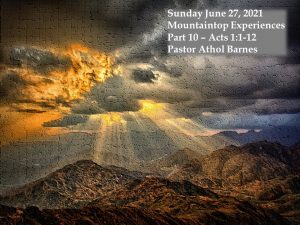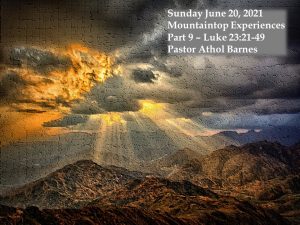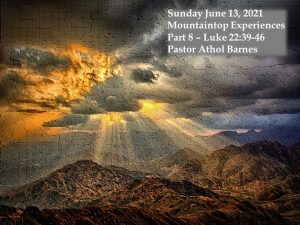
Acts 1:1-12
Have you ever struggled to complete a project in your home or on your computer, all the time not knowing that you had a tool or program that would have made your task so much easier?
Sometimes, in the church we attempt to do great programs and missional activity, but we do not utilize the one person who has the power to accomplish more than we could ever imagine. We ignore the Holy Spirit.
The Holy Spirit is way more than a handy tool, He is the power and the source of all fruit that we can expect as a church. In fact, without the Holy Spirit, there is no church.
It was on the mount of Olives that Jesus promised his disciples that he would send the Holy Spirit to baptize them with power. It was on this mountain where Jesus ascended into heaven as we read in Acts 1.
The book of the Acts of the Apostles is the account of the work of the Holy Spirit in and through the early church. This is the introduction to the church age, the same age in which we live. The time between when Jesus ascended into Heaven and the time he is coming back.
The church is the Body of Christ, the physical manifestation of the presence of Jesus on the earth and we have a job to do, we have a mission. Jesus’ life on earth was just the beginning.
Luke continues in verse 3 to emphasize the fact that Jesus rose from the dead. During the time after the resurrection of Jesus, there were a lot of rumors spread by the religious leaders that Jesus had not in fact risen. Luke just like the Apostle Paul in 1 Corinthians 15 makes it clear that Jesus gave many proofs of his life. This is the foundation of the message we have; Jesus is alive! If Jesus is not alive the church would not exist. The resurrection was the primary message of the first church, and it should be our primary message today.
Before he ascended, Jesus told his disciples to wait for the promise that he had spoken about in John 14:16-17. Even though they were eyewitnesses to the greatest events in all of History, they were not equipped for the task that lay ahead of them. The Holy Spirit is the indispensable equipment that the child of God and the Church has. It is imperative to remember that we don’t get to use the Holy Spirit, the Holy Spirit uses us.
Jesus goes on to say in verse 5, “…for John baptized with water, but you will be baptized withthe Holy Spirit not many days from now.” The tense of the verb “baptized” is a passive voice, which indicates that being filled with the Holy Spirit is a divine activity and comes about as we yield control of our lives to the power and lordship of Christ. This takes place as we yield control of our lives to Him daily. This is a spirit filled life and this is a life lived with Jesus as Lord.
Sadly, too many Christians live lives that do not require the power of the Holy Spirit. Living a passive Christian life does not require us to lean into God in desperation for His power. We as followers of Jesus have to be about the work of Kingdom, and in order to do that we need the presence of the Holy Spirit in our lives.
The Disciples didn’t understand what Jesus was talking about and began asking about the plans to overthrow the Roman authorities. Jesus doesn’t rebuke them for their misunderstanding, but simply states, “It is not for you to know times or seasons that the Father has fixed by his own authority. But you will receive power when the Holy Spirit has come upon you, and you will be my witnesses in Jerusalem and in all Judea and Samaria, and to the end of the earth.” Acts 1:7-8.
Jesus takes their focus off the desire for an earthly kingdom and directs them to the work that needs to be done. The Holy Spirit will enable them to be witnesses to go in ever widening circles from Jerusalem all the way to the ends of the earth.
Jesus explains that the power of the church does not come from programs, leaders, buildings, or political influence, the power of the church to do the work that we have been commissioned to do comes from the Holy Spirit (see Zechariah 4:6). Ordinary people are able to do extraordinary things because of the power of the Holy Spirit in their lives.
The gift of the Holy Spirit is the power to do the work, to be witnesses of the Gospel. That is the primary call on the church. The church must be outward focused, Jesus commanded it to be so.
Any church that focuses purely inward on fellowship and comfort of community, without looking beyond their four walls has already ceased to exist as a church. They may have many people coming to attend and enjoy the fellowship and worship music and programs, but they are not the body of Christ.
Jesus said that when the Holy Spirit comes on them, they will receive power and will be witnesses. You cannot be a witness to something you have not experienced. Do you have a testimony of your life being impacted by a personal relationship with Jesus Christ? You are a witness.
In the church we have turned evangelism into an academic pursuit. We can get trained into the mindset that people are simply targets and we must get through our presentation. If we do that, we miss out on the beauty and joy of the relationship and seeing that people are not targets, they are brothers and sisters that you haven’t gotten to know yet.
Right after Jesus gives this incredible task, verse 9 tells us that Jesus ascended into heaven.
As the disciples were looking up, two angels stood beside them and made an incredible promise that Jesus would return. Are you expecting his return?





